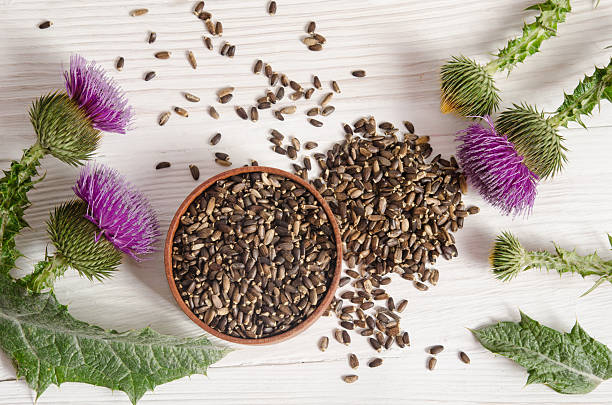
Though you might not have heard of it, milk thistle has been used to treat or manage certain conditions for years. It’s a herbal remedy that scientists have only recently started to study so it’s a good idea to keep your eye on it. Under the right conditions, it could have just the right health benefits that you’re looking for.
What Exactly Is Milk Thistle?
Milk thistle is a flowering herb that has its origins in the Meditteranean region. However, it can now be found in the eastern United States, California, South America, Africa, Australia, and Asia.
The prickly plant, with its distinctive purple flowers, has been used to treat conditions such as liver disorders, gallbladder issues, and cancer.
Now that it’s being studied, researchers suggest that the active compounds in milk thistle - known as silymarin - are responsible for all the health benefits.
5 Science-Based Health Benefits Of Milk Thistle

1. It Can Protect Your Liver
According to a few studies, milk thistle can be a helpful complementary treatment for those who are dealing with liver disease. Researchers suggest that this may be due to the herb’s antioxidant properties, which means it would protect the liver from damage and inflammation.
2. It Can Manage Your Blood Sugar Levels
In a recent study, researchers found that milk thistle could have a similar effect on blood sugar levels as diabetic medication. Participants in this study typically saw a reduction in their blood sugar as well as an increased sensitivity to insulin.
It’s also possible that milk thistle’s antioxidant and anti-inflammatory properties can help prevent diabetic complications. It’s important to note that these benefits have only been established for those with type 2 diabetes.
RELATED: Lower Your Cholesterol Without Medication
3. It Can Reduce Bad Cholesterol
Thus far, the benefits of milk thistle on the heart has only been studied in those who have diabetes.
However, the results show that the herb can reduce your levels of bad cholesterol levels, which makes heart disease less likely. It can also work as a complementary treatment for those who are taking medications to control their cholesterol levels.
4. It Can Prevent A Decline In Brain Function
Researchers surmise that this benefit is linked to milk thistle’s antioxidant and anti-inflammatory properties. The antioxidants protect the brain from damage while the anti-inflammatory compounds reduce swelling in the body. This combination can reduce your likelihood of developing degenerative diseases that affect the brain.
5. It Can Protect Your Bones
Osteoporosis is a disease that results in weakened bones because they’re no longer as dense as they need to be.
Based on a recent study, researchers found that milk thistle can encourage bone mineralization. As a result, taking the herb might reduce your risk of bone loss.
RELATED: Best Ways To Build Healthier, Stronger Bones
How It’s Usually Used
Most people consume milk thistle by eating its stem and leaves. You can add them to a salad if you’re not comfortable with eating those parts of the herb as is. Sometimes, there are milk thistle extracts available in health food stores.
Who Shouldn’t Take Milk Thistle
Though milk thistle is usually regarded as safe for consumption, there might be a few side effects when you take it. Some people have reported diarrhea, bloating, nausea, and itchiness.
Additionally, those who are allergic to artichokes, kiwi, ragweed, daisies, marigolds, and chrysanthemums are more likely to have a similar reaction to milk thistle.
If you’re pregnant or breastfeeding, it’s also not advisable to take milk thistle since this hasn’t been thoroughly tested.
Finally, if you take certain medications, you may be at risk for adverse interactions. The list could be longer but so far those who are taking drugs for high cholesterol, insomnia, infections, and diabetes should be cautious when consuming milk thistle.
There’s still a lot of research to be done to establish all the health benefits of milk thistle, but there’s enough evidence to suggest that it can be helpful to those who have concerns about liver disease, heart problems, and diabetes. To be on the safe side, however, you should talk to your doctor about any possible side effects or risks before adding the herb to your diet.









